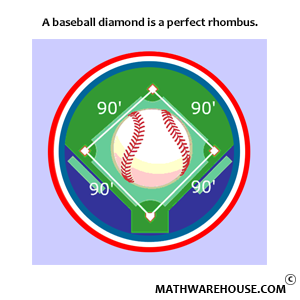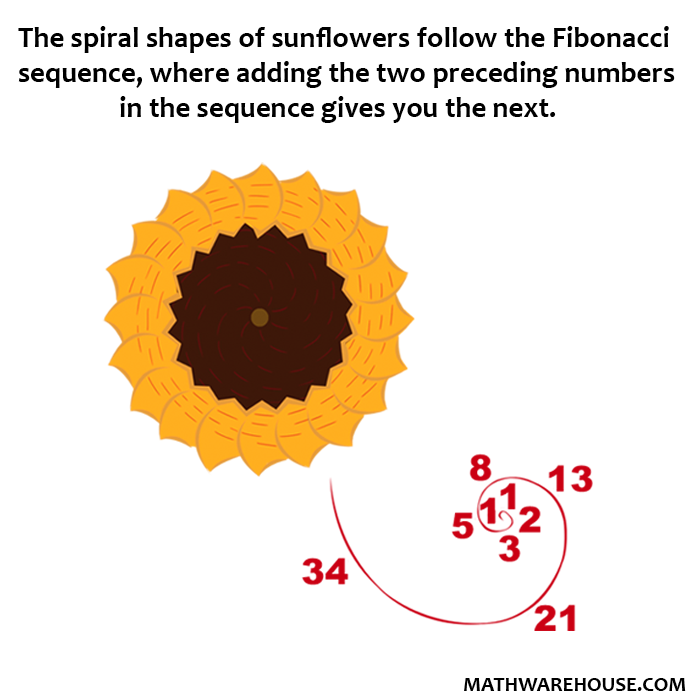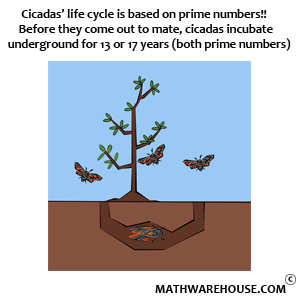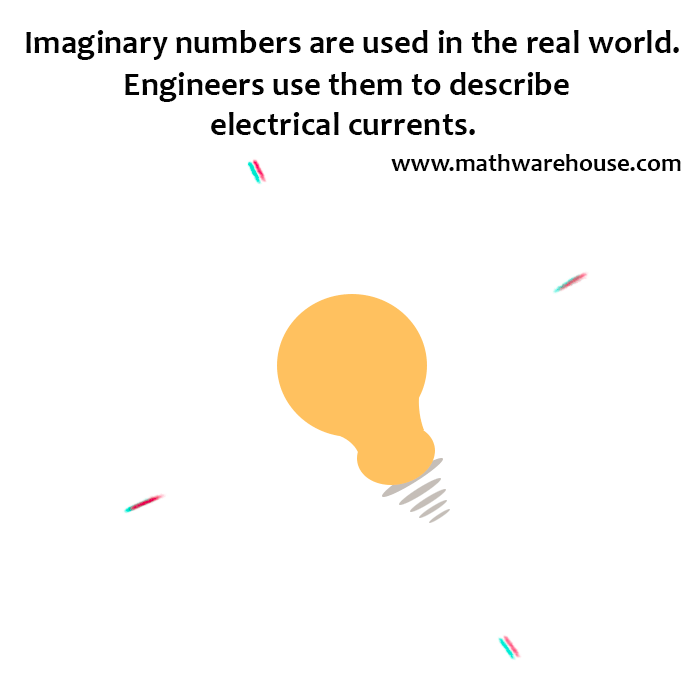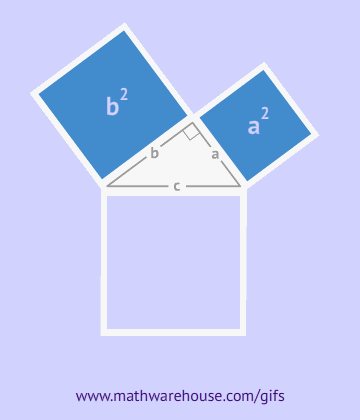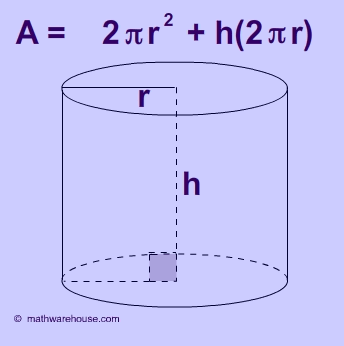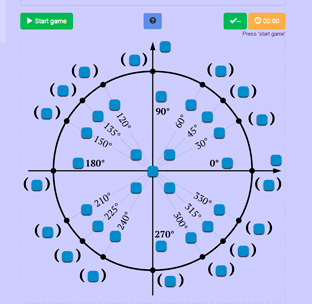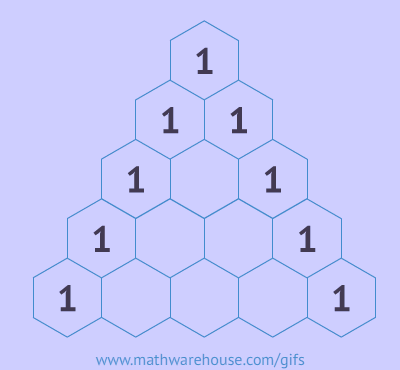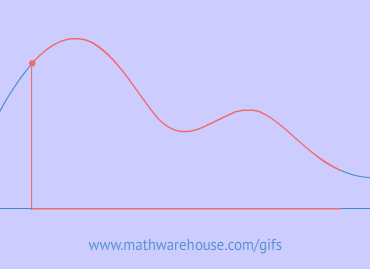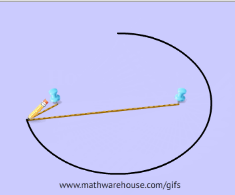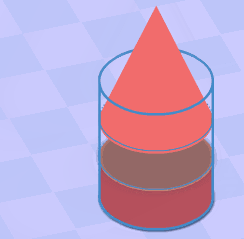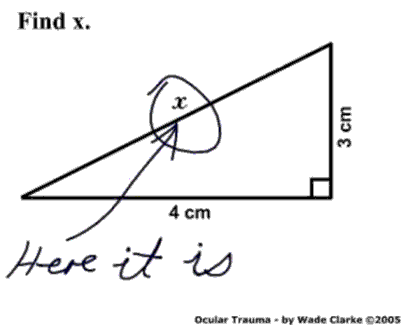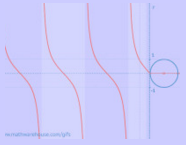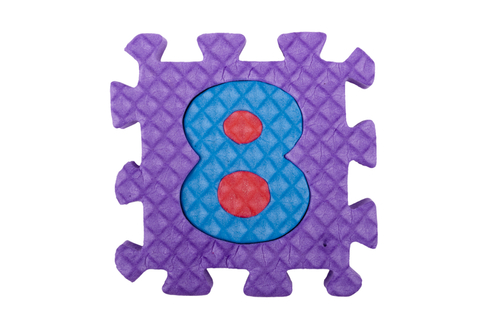Quick Overview
- The basic technique involves factoring out the highest power of the variable from both the numerator and denominator.
- Note: as $$x$$ grows infinitely large, fractions of the form $$\displaystyle \frac n {x^p}$$ approach 0.
Examples
Example 1
Evaluate $$\displaystyle \lim_{x\to\infty}\,\frac{3x^2 + 5x +2}{4x^2+8x -2}$$
Identify the highest power of $$x$$ in the function, and factor it out of both the numerator and denominator.
$$ \begin{align*}% \lim_{x\to\infty}\,\frac{3\blue{x^2} + 5x +2}{4\blue{x^2}+8x -2} % & =\lim_{x\to\infty}\,\frac{% \blue{x^2}\left(% 3 + \frac{5x}{\blue{x^2}} + \frac 2 {\blue{x^2}} \right) } {% \blue{x^2}\left(% 4+\frac{8x}{\blue{x^2}} - \frac 2 {\blue{x^2}} \right) }\\[6pt] % & = \lim_{x\to\infty}\,\frac{% \blue{x^2}\left(% 3 + \frac 5 x + \frac 2 {x^2} \right) } {% \blue{x^2}\left(% 4+\frac 8 x - \frac 2 {x^2} \right) } \qquad \mbox{ Simplify the fractions}\\[6pt] % & = \lim_{x\to\infty}\,\frac{% 3 + \frac 5 x + \frac 2 {x^2} } {% 4+\frac 8 x - \frac 2 {x^2} }% \qquad \mbox{ Divide out the common factors} \end{align*} $$
Evvaluate the limit.
$$ \displaystyle\lim_{x\to\infty}\,\frac{% 3 + \blue{\frac 5 x} + \blue{\frac 2 {x^2}} } {% 4+\red{\frac 8 x} - \red{\frac 2 {x^2}} } % = \frac{% 3 + \blue 0 + \blue 0 } {% 4 + \red 0 - \red 0 } % = \frac 3 4 $$
$$\displaystyle \lim_{x\to\infty}\, \frac{3x^2 + 5x +2}{4x^2+8x -2} = \frac 3 4$$
Example 2
Evaluate $$\displaystyle \lim_{x\to-\infty}\,\frac{4x^3+x^2-5x+1}{x^3+8x+6}$$
Factor out the highest power of $$x$$.
$$ \begin{align*} \lim_{x\to-\infty}\,\frac{4\blue{x^3}+x^2-5x+1}{\blue{x^3}+8x+6} % & = \lim_{x\to-\infty}\,\frac{% \blue{x^3}\left(% 4+\frac{x^2}{\blue{x^3}} -\frac{5x}{\blue{x^3}}+\frac 1 {\blue{x^3}} \right) } {% \blue{x^3}\left(% 1+\frac{8x}{\blue{x^2}}+\frac 6 {\blue{x^3}} \right) }\\[6pt] % & = \lim_{x\to-\infty}\,\frac{% \blue{x^3}\left(% 4+\frac 1 x -\frac 5 {x^2}+\frac 1 {x^3} \right) } {% \blue{x^3}\left(% 1+\frac 8 {x^2}+\frac 6 {x^3} \right) } \qquad \mbox{Simplify the fractions}\\[6pt] % & = \lim_{x\to-\infty}\,\frac{% 4+\frac 1 x -\frac 5 {x^2}+\frac 1 {x^3} } {% 1+\frac 8 {x^2}+\frac 6 {x^3} } \qquad \mbox{Divide out the common factors} \end{align*} $$
Evaluate the limit.
$$ \displaystyle\lim_{x\to-\infty}\,\frac{% 4+\blue{\frac 1 x} -\blue{\frac 5 {x^2}}+\blue{\frac 1 {x^3}} } {% 1+\red{\frac 8 {x^2}}+\red{\frac 6 {x^3}} } % = \frac{% 4 + \blue 0 - \blue 0 + \blue 0 } {% 1 + \red 0 + \red 0 } % = 4 $$
$$\displaystyle \lim_{x\to-\infty}\,\frac{4x^3+x^2-5x+1}{x^3+8x+6} = 4$$
Example 3
Evaluate $$\displaystyle \lim_{x\to\infty}\,\frac{3x^2 + 4x-2}{7x^3+4x^2-3x+5}$$
Factor out the largest power of $$x$$ from both the numerator and denominator. In this case, that's $$x^3$$.
$$ \begin{align*} \lim_{x\to\infty}\,\frac{3x^2 + 4x-2}{7\blue{x^3}+4x^2-3x+5} % & = \lim_{x\to\infty}\,\frac{% \blue{x^3}\left(% \frac{3x^2}{\blue{x^3}} + \frac{4x}{\blue{x^3}} - \frac 2 {\blue{x^3}} \right) } {% \blue{x^3}\left(% 7+\frac{4x^2}{\blue{x^3}} - \frac{3x}{\blue{x^3}} + \frac 5 {\blue{x^3}} \right) }\\[6pt] % & = \lim_{x\to\infty}\,\frac{% \blue{x^3}\left(% \frac 3 x + \frac 4 {x^2} - \frac 2 {x^3} \right) } {% \blue{x^3}\left(% 7+\frac 4 x - \frac 3 {x^2} + \frac 5 {x^3} \right) } \qquad \mbox{Simplify the fractions}\\[6pt] % & = \lim_{x\to\infty}\,\frac{% \frac 3 x + \frac 4 {x^2} - \frac 2 {x^3} } {% 7+\frac 4 x - \frac 3 {x^2} + \frac 5 {x^3} } \qquad \mbox{ Divide out the common factors} \end{align*} $$
Evaluate the limit.
$$ \displaystyle\lim_{x\to\infty}\,\frac{% \blue{\frac 3 x} + \blue{\frac 4 {x^2}} - \blue{\frac 2 {x^3}} } {% 7+\red{\frac 4 x} - \red{\frac 3 {x^2}} + \red{\frac 5 {x^3}} } % = \frac{% \blue 0 + \blue 0 - \blue 0 } {% 7 + \red 0 - \red 0 + \red 0 } % = 0 $$
$$\displaystyle \lim_{x\to\infty}\,\frac{3x^2 + 4x-2}{7x^3+4x^2-3x+5} = 0$$
Example 4
Evaluate $$\displaystyle \lim_{x\to\infty}\,\frac{4x^2+8x+9}{5x+3}$$
Factor out the highest power of $$x$$ from both the numerator and denominator. In this case, that is $$x^2$$.
$$ \begin{align*} \lim_{x\to\infty}\,\frac{4\blue{x^2}+8x+9}{5x+3} % & = \lim_{x\to\infty}\,\frac{% \blue{x^2}\left(% 4 + \frac{8x}{\blue{x^2}} + \frac 9 {\blue{x^2}} \right) } { \blue{x^2}\left(% \frac{5x}{\blue{x^2}}+\frac 3 {\blue{x^2}} \right) }\\[6pt] % & = \lim_{x\to\infty}\,\frac{% \blue{x^2}\left(% 4 + \frac 8 x + \frac 9 {x^2} \right) } { \blue{x^2}\left(% \frac 5 x+\frac 3 {x^2} \right) } \qquad \mbox{Simplify the fractions}\\[6pt] % & = \lim_{x\to\infty}\,\frac{% 4 + \frac 8 x + \frac 9 {x^2} } {% \frac 5 x+\frac 3 {x^2} } \qquad \mbox{Divide out the common factors} \end{align*} $$
Evaluate the limit.
$$ \displaystyle\lim_{x\to\infty}\,\frac{% 4 + \blue{\frac 8 x} + \blue{\frac 9 {x^2}} } {% \red{\frac 5 x}+\red{\frac 3 {x^2}} } % = \frac{% 4 + \blue 0 + \blue 0 } { \red 0 + \red 0 } % = \frac 4 0 $$
This means the limit doesn't exist. Since it has an $$\frac n 0$$ form, it will be an infinite limit.
Determine whether the function goes to infinity or negative infinity.
- As $$x$$ gets larger, the numerator is positive.
- As $$x$$ gets larger, the denominator is positive.
Since both the numerator and denominator are positive, the function will be positive.
$$\displaystyle \lim_{x\to\infty}\,\frac{4x^2+8x+9}{5x+3} = \infty$$
Practice Problems
Factor the highest power of $$x$$ out of the numerator and denominator. Divide out the common factor.
$$ \begin{align*}% \lim_{x\to\infty}\,\frac{4\blue x+9}{6\blue x-7} % & = \lim_{x\to\infty}\,\frac{% \blue x\left(% 4+\frac 9{\blue x} \right) } {% \blue x\left(% 6-\frac 7{\blue x} \right) }\\[6pt] % & = \lim_{x\to\infty}\,\frac{4+\frac 9 x}{6-\frac 7 x} \end{align*} $$
Evaluate the limit.
$$ \displaystyle\lim_{x\to\infty}\,\frac{% 4+\blue{\frac 9 x} } {% 6-\red{\frac 7 x} } % = \frac{% 4+\blue 0 } {% 6-\red 0 } % = \frac 2 3 $$
$$\displaystyle \lim_{x\to\infty} \frac{4x+9}{6x-7} = \frac 2 3$$.
Factor the highest power of $$x$$ out of the numerator and denominator. Divide out the common factor.
$$ \begin{align*}% \lim_{x\to-\infty}\,\frac{\blue{x^2}+3x+8}{7\blue{x^2}-5} % & = \lim_{x\to-\infty}\,\frac{% \blue{x^2}\left(% 1+\frac{3x}{\blue{x^2}}+\frac 8 {\blue{x^2}} \right) } { \blue{x^2}\left(% 7-\frac 5 {\blue{x^2}} \right) }\\[6pt] % & = \lim_{x\to-\infty}\,\frac{% \blue{x^2}\left(% 1+\frac 3 x+\frac 8 {x^2} \right) } { \blue{x^2}\left(% 7-\frac 5 {x^2} \right) }\\[6pt] % & = \lim_{x\to-\infty}\,\frac{% 1+\frac 3 x+\frac 8 {x^2} } {% 7-\frac 5 {x^2} } \end{align*} $$
Evaluate the limit.
$$ \displaystyle\lim_{x\to-\infty}\,\frac{% 1+\blue{\frac 3 x} + \blue{\frac 8 {x^2}} } {% 7-\red{\frac 5 {x^2}} } % = \frac{% 1+\blue 0 + \blue 0 } {% 7-\red 0 } % = \frac 1 7 $$
$$\displaystyle \lim_{x\to-\infty}\, \frac{x^2+3x+8}{7x^2-5} = \frac 1 7$$.
Factor the highest power of $$x$$ out of the numerator and denominator. Divide out the common factor.
$$ \begin{align*}% \lim_{x\to\infty}\,\frac{5x-1}{2\blue{x^2}-11x+4} % & = \lim_{x\to\infty}\,\frac{% \blue{x^2}\left(% \frac{5x}{\blue{x^2}}-\frac 1 {\blue{x^2}} \right) } {% \blue{x^2}\left(% 2-\frac{11x}{\blue{x^2}}+\frac 4{\blue{x^2}} \right) }\\[6pt] % & = \lim_{x\to\infty}\,\frac{% \blue{x^2}\left(% \frac 5 x-\frac 1 {x^2} \right) } {% \blue{x^2}\left(% 2-\frac{11} x+\frac 4 {x^2} \right) }\\[6pt] % & = \lim_{x\to\infty}\,\frac{% \frac 5 x-\frac 1 {x^2} } {% 2-\frac{11} x+\frac 4 {x^2} } \end{align*} $$
Evaluate the limit.
$$ \displaystyle\lim_{x\to\infty}\,\frac{% \blue{\frac 5 x} - \blue{\frac 1 {x^2}} } {% 2-\red{\frac{11} x}+\red{\frac 4 {x^2}} } % = \frac{% \blue 0 - \blue 0 } {% 2 - \red 0 + \red 0 } % = 0 $$
$$\displaystyle \lim_{x\to\infty}\,\frac{5x-1}{2x^2-11x+4} = 0$$
Factor the highest power of $$x$$ out of the numerator and denominator. Divide out the common factor.
$$ \begin{align*}% \lim_{x\to-\infty}\,\frac{6x^2+x-13}{8\blue{x^3}-3x^2+9x+2} % & = \lim_{x\to-\infty}\,\frac{% \blue{x^3}\left(% \frac{6x^2}{\blue{x^3}}+ \frac{x}{\blue{x^3}} - \frac{13}{\blue{x^3}} \right) } {% \blue{x^3}\left(% 8-\frac{3x^2}{\blue{x^3}}+\frac{9x}{\blue{x^2}}+ \frac 2 {\blue{x^3}} \right) }\\[6pt] % & = \lim_{x\to-\infty}\,\frac{% \blue{x^3}\left(% \frac 6 x+ \frac 1 {x^2} - \frac{13}{x^3} \right) } {% \blue{x^3}\left(% 8-\frac 3 x+\frac 9 {x^2}+ \frac 2 {x^3} \right) }\\[6pt] % & = \lim_{x\to-\infty}\,\frac{% \frac 6 x+ \frac 1 {x^2} - \frac{13}{x^3} } {% 8-\frac 3 x+\frac 9 {x^2}+ \frac 2 {x^3} } \end{align*} $$
Evaluate the limit.
$$ \displaystyle\lim_{x\to-\infty}\,\frac{\blue{\frac 6 x} + \blue{\frac 1 {x^2}} - \blue{\frac{13}{x^3}}}{8-\red{\frac 3 x} + \red{\frac 9 {x^2}} + \red{\frac 2 {x^3}}} % = \frac{\blue 0 + \blue 0 - \blue 0}{8 - \red 0 + \red 0 + \red 0} % = 0 $$
$$ \displaystyle \lim_{x\to-\infty}\,\frac{6x^2+x-13}{8x^3-3x^2+9x+2} = 0 $$
Factor the largest power of $$x$$ out of the numerator and denominator. Divide out the common factor.
$$ \begin{align*}% \lim_{x\to -\infty}\, \frac{6\blue{x^2}+4x+1}{3x-5} % & = \lim_{x\to -\infty}\, \frac{% \blue{x^2}\left(% 6 + \frac{4x}{\blue{x^2}}+ \frac 1 {\blue{x^2}} \right) } {% \blue{x^2}\left(% \frac{3x}{\blue{x^2}} - \frac 5 {\blue{x^2}} \right) }\\[6pt] % & = \lim_{x\to -\infty}\, \frac{% \blue{x^2}\left(% 6 + \frac 4 x+ \frac 1 {x^2} \right) } {% \blue{x^2}\left(% \frac 3 x - \frac 5 {x^2} \right) }\\[6pt] % & = \lim_{x\to -\infty}\, \frac{% 6 + \frac 4 x+ \frac 1 {x^2} } {% \frac 3 x - \frac 5 {x^2} } \end{align*} $$
Evaluate the limit.
$$ \displaystyle\lim_{x\to -\infty}\, \frac{% 6 + \blue{\frac 4 x} + \blue{\frac 1 {x^2}} } {% \red{\frac 3 x} - \red{\frac 5 {x^2}} } % = \frac{% 6 + \blue 0 + \blue 0 } { \red 0 - \red 0 } % = \frac 6 0 $$
The limit does not exist. However, since it has the $$\frac n 0$$ form, it will be an infinite limit.
Determine in which direction the function is growing larger.
- As $$x$$ becomes more negative, the numerator is positive.
- As $$x$$ becomes more negative, the denominator is negative.
Since the numerator is positive, but the denominator is negative, the function will be negative.
$$ \displaystyle \lim_{x\to -\infty}\, \frac{6x^2+4x+1}{3x-5} = -\infty $$
Factor the largest power of $$x$$ out of the numerator and denominator. Then divide out the common factor.
$$ \begin{align*}% \lim_{x\to-\infty}\,\frac{2\blue{x^5}+5x^3-7x}{6x^3-7x+3} % & = \lim_{x\to-\infty}\,\frac{% \blue{x^5}\left(% 2+\frac{5x^3}{\blue{x^5}}- \frac{7x}{\blue{x^5}} \right) } {% \blue{x^5}\left(% \frac{6x^3}{\blue{x^5}} - \frac{7x}{\blue{x^5}} + \frac 3 {\blue{x^5}} \right) }\\[6pt] % & = \lim_{x\to-\infty}\,\frac{% \blue{x^5}\left(% 2+\frac 5 {x^2}- \frac 7 {x^4} \right) } {% \blue{x^5}\left(% \frac 6 {x^2} - \frac 7 {x^4} + \frac 3 {x^5} \right) }\\[6pt] % & = \lim_{x\to-\infty}\,\frac{% 2+\frac 5 {x^2}- \frac 7 {x^4} } {% \frac 6 {x^2} - \frac 7 {x^4} + \frac 3 {x^5} } \end{align*} $$
Evaluate the limit.
$$ \displaystyle\lim_{x\to-\infty}\,\frac{% 2+\blue{\frac 5 {x^2}} - \blue{\frac 7 {x^4}} } {% \red{\frac 6 {x^2}} - \red{\frac 7 {x^4}} + \red{\frac 3 {x^5}} } % = \frac{% 2+\blue 0 - \blue 0 } {% \red 0 - \red 0 + \red 0 } % = \frac 2 0 $$
The limit does not exist. However, since the limit has the form $$\frac n 0$$ it will be an infinite limit.
Determine the direction the function is headed as $$x$$ grows more negative.
- As $$x$$ becomes more negative, the numerator will be negative.
- As $$x$$ becomes more negative, the denominator will be negative.
Since both the numerator and denominator are negative, the function will be positive.
$$ \displaystyle \lim_{x\to-\infty}\,\frac{2x^5+5x^3-7x}{6x^3-7x+3} = \infty $$

